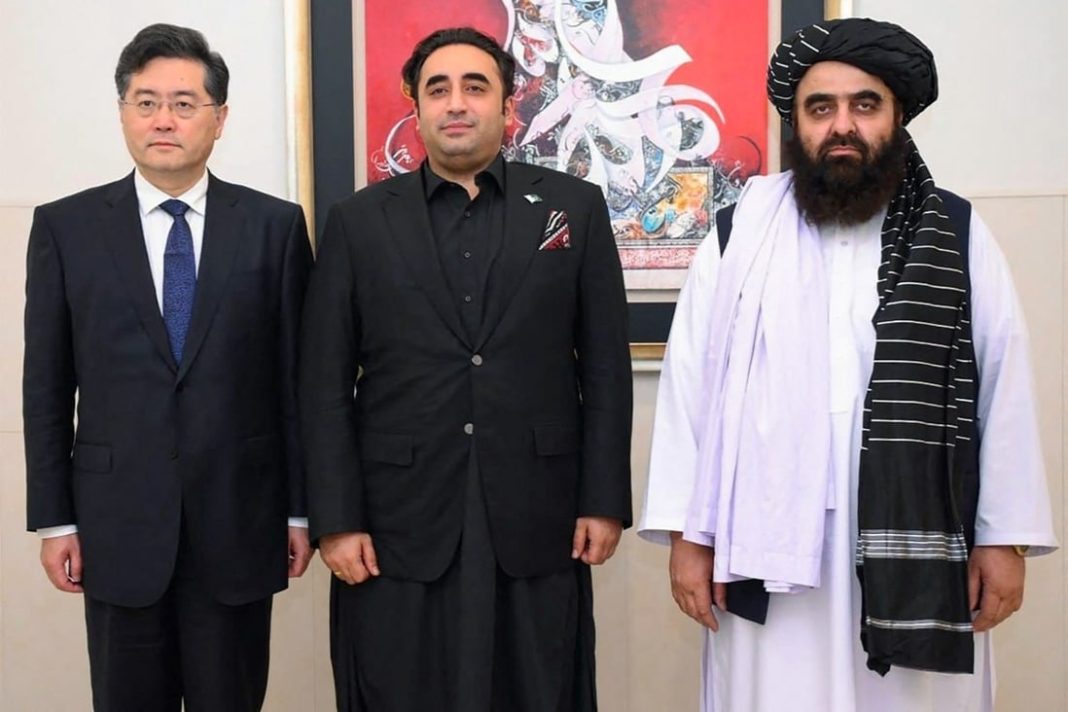The ministers agreed on Sunday to uphold good relations, deepen political mutual trust, respect each other’s sovereignty and territorial integrity, and properly address differences and disputes through equal consultation.
Since the withdrawal of United States forces in August 2021, Afghanistan has suffered an economic and humanitarian crisis as the Taliban took over and the nation was plunged into international isolation.
The Taliban government has since hoped to attract Chinese investment in its reserves of minerals such as copper and lithium.
The acting foreign minister of Afghanistan, Amir Khan Muttaqi, who is subject to a travel ban by the United Nations Security Council (UNSC) but was given an exemption to visit Islamabad, met his Chinese counterpart, Qin Gang. He is due to have a bilateral meeting with Pakistani Foreign Minister Bilawal Bhutto Zardari later on Sunday.
China has invested billions in Pakistan through the China-Pakistan Economic Corridor (CPEC), an under-construction network of roads, railways and ports.
China’s foreign ministry appears interested in investing in Afghanistan. Just a month ago, it said it “welcomes Afghanistan’s participation in Belt and Road cooperation and supports Afghanistan’s integration into regional economic cooperation and connectivity”.
Qin stated that China is ready to make joint efforts with Afghanistan and Pakistan to implement the Global Development Initiative, Global Security Initiative and Global Civilization Initiative, according to Xinhua news agency.
The three sides also pledged to strengthen counterterrorism cooperation, with China and Pakistan expressing their support for the Taliban-led Afghan government to strengthen capacity building to deal with “terrorist” actors.
The Taliban in Afghanistan and Pakistan Taliban, known by the acronym TTP, are separate groups but share an ideology. Last week, at least six Pakistani soldiers were killed in a gun battle with TTP fighters in the northwestern region of the country near the Afghan border.
Attacks like these have become more frequent since last year after the TTP revoked a Taliban-brokered ceasefire and peace talks with the government in Islamabad collapsed.
China also wants to see a more stable security landscape in Afghanistan before it begins investment projects in the country.
Afghanistan stressed that it would not allow any armed group to use its territory for activities against China and Pakistan.
Qin called for coordination and cooperation mechanisms among neighbours of Afghanistan within the regional multilateral framework.
For their part, Zardari and Muttaqi said the China-Afghanistan-Pakistan cooperation is of great significance to regional peace and prosperity.
They added Afghanistan and Pakistan are willing to actively promote trilateral cooperation, formulate a roadmap for cooperation in such fields as politics, security and economy, safeguard the common interests of the three countries, achieve mutual benefit and win-win results, and bring benefits to the people of the three neighbours and other countries in the region.
China and Pakistan made it clear at the meeting that they oppose interference in Afghanistan’s internal affairs, illegal unilateral sanctions against Afghanistan, and all acts that undermine regional peace and stability.
The Pakistan foreign ministry announced in a statement that China and Pakistan had “underscored the need for the international community to provide continued assistance and support to Afghanistan, including through unfreezing of Afghanistan’s overseas financial assets”.
Nearly $10bn in Afghan assets have been frozen by the US after the Taliban took over the country in a military blitzkrieg in 2021 as the West-backed government of President Ashraf Ghani collapsed.
The statement also said they had agreed to continue their humanitarian and economic assistance for the Afghan people and enhance development cooperation in Afghanistan, including through the extension of CPEC to Afghanistan.
